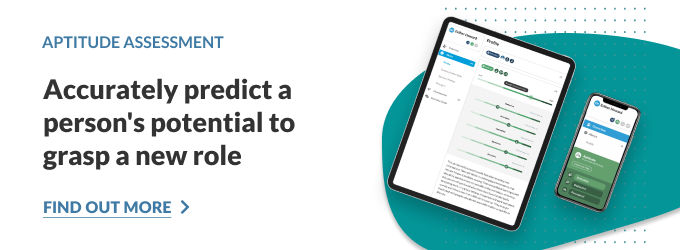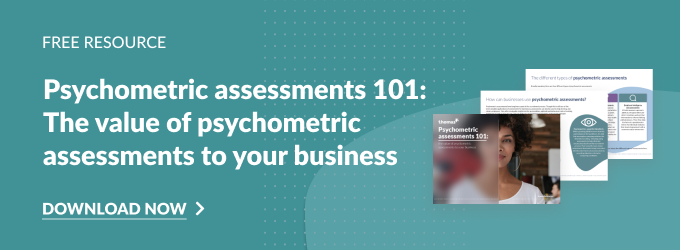Logical reasoning tests are designed to measure your ability or aptitude to reason logically. They are non-verbal assessments which specifically test your ability to analyse through logical and abstract reasoning, extracting rules and structures to help you find the answer from a list of options.
Logical reasoning tests are designed to test your logical reasoning, ability to conclude time pressure and accuracy. On the whole, logical reasoning is based on what someone can interpret within sequences and patterns thus it's seen as pure reasoning ability.
In this guide, we will look at what a logical reasoning test looks like, why they are used by employers, how you can prepare for one and some practice questions of a logical reasoning test.

What is a logical reasoning test?
Logical reasoning tests can include diagrams, inductive reasoning, deductive reasoning, abstract reasoning and critical thinking. Fundamentally, logical reasoning is testing a candidate’s problem-solving ability or higher use of logic.
We use logic on a day-to-day basis for all sorts of tasks or roles. On the whole, logical reasoning tests are trying to get us to understand a problem and find a solution in the fastest time possible.
As discussed, there are many different types of tests for logical reasoning:
Abstract reasoning
Abstract reasoning tests encompass a broad array of testing that examines candidates’ ability to understand abstract concepts and patterns. Candidates will often be required to mentally manipulate shapes or patterns to figure out the next part of a series or to identify the odd one out in a collection of images.
Diagrammatic testing
Diagrammatic testing is a specific form of abstract reasoning. Typically a test will present a diagram of flowcharts and symbols with inputs and outputs. Candidates will need to identify which inputs affect diagrams, and therefore generate a specific output based on those rules.
Inductive reasoning
Inductive reasoning is the ability to reach a general conclusion based on perceived patterns already observed. Usually, candidates will be presented with a pattern and need to select the next pattern that continues a sequence.
Deductive reasoning
Deductive reasoning involves a general rule that leads to a specific conclusion. This type of test will evaluate a candidate’s ability to make logical arguments and draw conclusions from the data provided.
Critical thinking
Critical thinking tests evaluate how well a candidate can analyse, evaluate, and form well-reasoned judgements, typically based on a series of arguments or scenarios presented to them. They’ll often have to identify assumptions and logical fallacies to answer the questions correctly.

Why are logical reasoning tests used by employers?
Employers like to use logical reasoning tests to reveal a candidate’s ability to think laterally, and logically and judge situations, indicating future performance. This is handy for roles where analytical thinking and complex problem-solving occur.
Because we use logic-based practices in our day-to-day life, logical reasoning tests are used at the start of a recruitment process to help filter high volumes of candidates and applications.
Logical reasoning tests are also used as part of a wider approach of testing, and never used solely for assessments. They help senior managers try to understand where there could be potential for candidates to succeed in roles and climb the corporate ladder, whilst other recruitment managers use the data to help guide the applicant's role within the business.
High performance in logical reasoning tests has been found to correlate to subsequent high performance on the job, so employers trust the results.
Advantages of logical reasoning tests for recruitment
There are several distinct advantages to including logical reasoning tests as part of your recruitment process. While they certainly shouldn’t be your only means of assessing candidates for a specific role, they can play a huge part in identifying potential high-performing candidates and in screening high volumes of applicants in the early stages of hiring. Here are some of the biggest reasons to use logical reasoning tests in your recruitment process:
Objective assessment
Logical reasoning tests offer a fair and objective way to evaluate talent. You can reduce the impact of any biases in your process, while also getting a standardised and consistent evaluation of candidates across multiple recruitment waves.
Predictive validity
Local reasoning tests are a strong predictor of job performance in many academic studies. High-performing candidates typically display excellent critical thinking and problem-solving skills which are essential in the modern workforce.
Benchmarking
Consistent testing across recruitment waves allows employers to develop benchmark scores based on the performance of successful employees. This will lead to a much more robust and successful hiring process, where high-performing candidates can be identified much earlier.
Time and cost-efficient
Logical reasoning tests can be administered quickly and at a relatively low cost, enabling employers to screen a large volume of candidates in a very short period. The resources saved at this initial stage can then be spent in the later stages where more nuance is needed to select the right candidate.
High job specificity
Logical reasoning tests can be tailored to suit specific skills and job roles. This allows hiring managers to better identify candidates who have the requisite skills to succeed in the role they’re hiring for.
It’s also important to understand that logical reasoning tests aren’t perfect. There are potential biases and limitations that you should be mindful of to ensure fairness and inclusivity.
Some questions may rely on cultural references or contexts that some groups may not be as familiar with. Language proficiency can also play a role in test scores, particularly if the test is not administered in a candidate’s primary language. Some candidates may also face difficulties completing tests due to certain disabilities, meaning that reasonable accommodations will need to be made.
To make sure your testing is fair and inclusive, ensure that all tests are appropriately validated against the role you’re hiring for. Use diverse testing teams to limit the chances for cultural or language-based biases. Pilot test anything you plan to roll out at a larger scale before fully adopting it, and make sure to combine logical reasoning tests with other assessment methods to ensure a comprehensive assessment of every candidate and their abilities.
Importance of logical reasoning
Logical reasoning plays a huge role in any job interview, with employers typically seeking candidates with high levels of problem-solving, critical thinking, and decision-making skills. However, logical reasoning also plays quite an important role in several other areas.
Logical reasoning is often at the heart of a lot of academic successes. Being able to analyse, understand, and evaluate the material from textbooks and lecture notes is one of the most important aspects of academic pursuits. Local reasoning lets students break complex topics into more manageable sections, leading to better understanding and retention of information. Logic is also an integral part of most areas of mathematics, with logical reasoning needed to identify appropriate formulas and methods to solve equations. Finally, logical reasoning is crucial when constructing cogent arguments in a research paper. It allows students to guide readers through their thought processes, illustrating their respective points.
Logical reasoning even plays a large role in our everyday lives. Using logical reasoning, we can make informed choices in everyday matters such as finance or health. It also helps us avoid certain cognitive biases, protecting us from being influenced by poor reasoning in our day-to-day interactions. Logical reasoning is also highly important when it comes to effective communication. It allows us to get our ideas across coherently and convincingly.
While logical reasoning is utilised in essentially any profession, some industries rely on it more heavily than others.

Finance
Logical reasoning is essential for those working in the finance industry. Skills such as analysing financial data, risk assessment, or financial modelling all require high-level problem-solving, often under significant amounts of pressure or tight time constraints. At all times, various factors and probabilities need to be considered and assessed to give clients the most accurate and up-to-date information possible.
When hiring in this industry, logical reasoning tests can assess a candidate’s ability to interpret data or make financial projections. Common tests will often involve numerical reasoning and data interpretation to mimic the type of work that will be carried out by the successful applicant.
Engineering
Engineers are tasked with designing, analysing, and innovating — all skills that require strong logical reasoning skills. At any given time they may need to address advanced design challenges, assess for potential system flaws before implementation, or try to break down and understand extremely complex systems to complete their projects.
Logical reasoning tests aimed at engineering roles will often focus on spatial reasoning, abstract reasoning, and pattern recognition to highlight those with both strong logical reasoning skills and the ability to think laterally.
Computer science
Programmers and software engineers rely on logical reasoning every day in their jobs. Algorithm development, testing and debugging code, and assessing system architecture all require advanced logic and strong problem-solving skills.
A logical reasoning test specifically for a computer science position will likely rely heavily on a combination of numerical reasoning and abstract reasoning to determine the best prospects.
Tips for practising for logical reasoning tests
The best way to practice for any logical reasoning test is to do lots of practice. You need to become familiar with the kinds of tests that are being presented, the formats and the logic that they are testing.
There are lots of online practice tools where you can begin. A Google search for “logical reasoning practice tests” will pull up a lot of different online resources that you can access for free. Be sure to go through different models as well. Not all practice tests should be diagrammatic, look out for deductive and inductive reasoning tests and get your eyes on as many different kinds of tests to push your practice.
One of the best tips you can take for a logical reasoning assessment is to slow down. Read and study the information carefully before answering, and before you answer, work through the information using logical approaches. Look at sequences before answers, and understand what the question is trying to get you to answer.
You should also do the tests under timed conditions, as per how the real tests are taken. They are usually 15 to 30 minutes long. By doing tests in these real case scenarios, you are priming your mind to respond to things which will become second nature.
Finally, because there are so many types of tests, it’s important to ask the employer what test is being used before you go to take it. You could be practicing diagrammatic when in effect you need to practice critical thinking examples. Don’t be afraid to ask, this can be the difference between you succeeding or not.
Overcoming challenges in logical reasoning tests
While being tested, you may encounter various difficulties that have the potential to bring down your score. Here are some of the most common challenges candidates typically face, and how to deal with them:
Time constraints
Time limits can often lead to poor decision-making or rushed answers. To avoid this, make sure you practice with time constraints so that you’re used to working under those conditions. Divide the total time you have by the number of test questions to get an idea of how long you should be spending on each question and try to stick to this. Finally, don't be afraid to leave a challenging question and come back to it later if time allows.
Complex problems
Logical reasoning tests may present you with extremely complex scenarios that require you to analyse multiple aspects at the same time to find the correct answer. In this situation, try to break down the problem into all of its parts. Tackle these separately and then try to look for patterns or shared elements that may help you piece everything together.
Test anxiety
It’s natural to feel some form of anxiety around logical reasoning testing, especially in situations such as job applications. To make sure this doesn’t impact your decision-making, ensure you have as much practice done before the test as possible. The better prepared you are, the more equipped you’ll be to deal with any test-related anxiety. Deep breathing or other relaxation techniques can be used before or even during the test to stay calm, just make sure you're paying attention to the clock to avoid running out of time.





